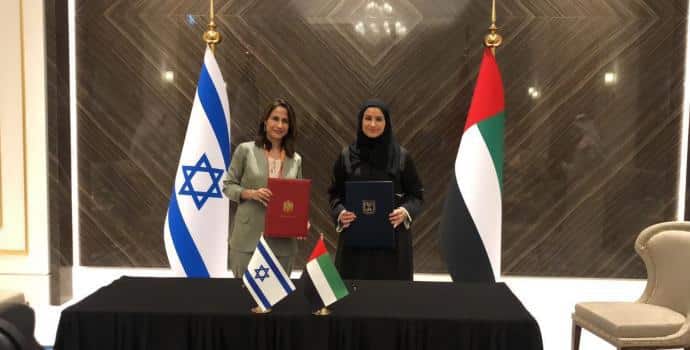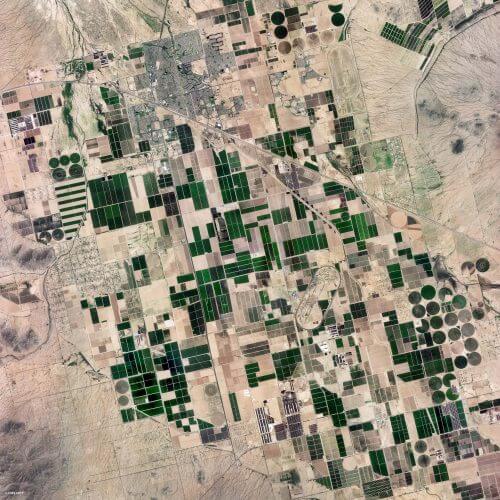All research proposals are shared by researchers from Israel and the United Arab Emirates and will work to promote solutions to the Earth's environmental and climate challenges from data collected from space

The Israel Space Agency in the Ministry of Innovation, Science and Technology and the Space Agency of the United Arab Emirates are publishing today the first joint call inviting research groups in Israel and the United Arab Emirates to submit joint research proposals based on data collected from the Venus satellite for monitoring the environment and vegetation on Earth.
This project is the first cooperation between the countries in the field of space, as was signed in the memorandum of understanding between the governments of Israel and the United Arab Emirates in October 2021 in Dubai.
The research proposals will deal with the climate crisis with a focus on precision agriculture and the study of water bodies. All research proposals will be based on data and information from the Venus satellite. A joint satellite of the Israeli Space Agency and the French Space Agency for monitoring the vegetation and the environment on Earth.
The deadline for submitting proposals is the sixteenth of March 2022. All proposals submitted will be examined by a joint committee of Israel and the United Arab Emirates that will select one project for funding. The project Whoever is chosen will receive funding including של 200,000 dollar for two years from the Israeli Space Agency and the United Arab Emirates Space Agency.
Minister of Innovation, Science and Technology, Orit Farkash HaCohen: "The important cooperation between Israel and the Emirates in space, which starts today, shows that technology connects nations.
The Venus satellite helps to find solutions to deal with the climate crisis. The joint research will help promote common issues between the Emirates and Israel, including smart agriculture, promoting climate issues and more.
Thanks to Sarah Sarah El Amiri for the partnership and shared vision. Governments sign agreements, but the people are the ones who make the peace, the cooperation that comes out today is another proof of that."
UAE Minister of Advanced Technologies and Chairman of the UAE Space Agency, Sarah Bint Youssef Al Amiri: "Global collaborations are the key to leveraging space to protect the planet. By partnering with other leading countries in the field of space, we are contributing to the expansion of the global scientific knowledge base, to help humanity develop solutions to its greatest challenges.'
The satellite "Venus"

Environmental research satellites, such as Venus, have gained increasing importance in recent years mainly in light of Earth's environmental problems such as population density, the depletion of agricultural and food areas, infections and natural disasters. The Venus satellite monitors, among other things, the condition of the soil, vegetation, forestry, agriculture, the quality of water lines in fields and natural areas around the world and can help farmers with regard to precision in irrigation and what is known as precision agriculture.
The Venus satellite is equipped with a special camera that can pick up details on the Earth's surface in 12 wavelengths, including details that are not visible to the eye. The satellite photographs permanent and extensive areas in Israel and around the world and is already providing researchers around the world with dozens of images every day. The satellite orbit allows a return time with a daily frequency for photographing the same areas and at the same viewing angle, which makes it possible to detect frequent changes in vegetation, soil, beaches, inland bodies of water and the atmosphere. The dimensions of the Venus satellite are similar to the dimensions of a domestic refrigerator and its weight is 270 kilograms. The satellite is equipped with a technological satellite that includes an electric propulsion system.
Venus is the first civilian Israeli satellite initiated by the Israel Space Agency in the Ministry of Innovation, Science and Technology in collaboration with the French Space Agency and is considered the smallest of its kind in the world. Three Israeli space industries were involved in the construction of the satellite: the Israel Aerospace Industries, which also integrated the camera and motors, the electric motors were designed and built by Rafael and the camera by Elbit Electro-Optics El Op. The images from the satellite arrive at the research center at the Sde Boker campus of Ben-Gurion University in the Negev.
